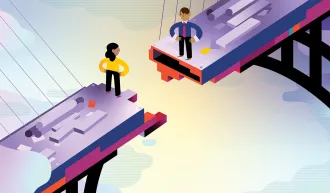Digital piracy costs music, movie, and software industries billions of dollars in profits. With decentralized peer-to-peer online networks offering covert means for people to swap files, digital goods producers are waging a global war against such networks and individual users. But, says Tunay Tunca, assistant professor of operations, information, and technology, efforts to battle internet piracy can sometimes strategically hurt digital goods industries.
Suing file-sharing internet networks and the consumers who use them to trade copyrighted material can backfire, argues Tunca, resulting in significant loss of profits for legal producers of information goods. Globally, the greater enemy is third-party commercial pirates who vend illegal copies of CDs and DVDs filled with music, movies, and software. Tunca argues that legal digital goods producers can benefit from strategically using the presence of individual file sharers to reduce the damage from commercial pirates.
“In developed markets like the United States and nations in Western Europe, there’s a substantial amount of internet piracy and the music industry in particular is very worried about it,” says Tunca, the Moghadam Family Faculty Fellow at Stanford GSB. As a result, the industry is spending considerable money and resources suing peer-to-peer networks and individual users across the globe. “One of the problems is that most of the individuals sued turn out to be regular citizens like college kids, single moms, and low-income people. It creates bad press and alienates the fan base,” Tunca observes. “However,” he adds, “that is only part of the problem.”
Not only is the process of legally nabbing internet infringers damaging from a public relations perspective, it is costly and ends up driving amateurs right into the arms of commercial pirates. “Commercial piracy exists in every country in varying degrees and is particularly virulent in emerging markets, such as those of Eastern Europe, South America, and parts of Asia,” says Tunca. “That third-party industry is where the real threat is because it provides a product which is a closer substitute to the legal one, since any consumer with any level of technological savvy can purchase it. In contrast, individual piracy can only be performed by a limited segment of the population, namely those who can use the technology and are willing to invest their time into the file-sharing activity.”
Suing file-sharing technology providers and illegal downloaders aims to reduce the consumer population that is able to pirate individually. Using mathematical models, however, Tunca and Ph.D. candidate Qiong Wu demonstrated that an increase in the number of consumers who can or prefer to pirate over the internet does not necessarily result in fewer profits for a legal publisher.
A key point is that having a larger population of individual copiers means less demand for commercial pirates. “With increased internet piracy activity, just to be able to stay in business, the commercial pirates may be forced not to price very competitively,” says Tunca. “The legal publishers can take advantage of this situation by strategically manipulating their prices to suppress the commercial piracy activity or drive them out of certain consumer market segments.” That means a larger market share for the legal vendors, as many more consumers without the technological savvy to pirate by themselves will be channeled to obtaining the product legally. As a result, the industry’s profits can go up.
“That does not necessarily mean that it will work exactly the same way in every country or market. Every country has its own characteristics and those should be considered when determining copyright protection policy,” Tunca says. “But the root effect is there. The critical thing is that tolerating internet piracy to a certain degree may hurt the party who hurts the legal publishers even more. That’s why we call it ‘fighting fire with fire.’ Your enemy’s enemy turns out to be your friend.”
Producers of digital goods, then, may want to consider easing off their legal activities as a strategy in a world where bits and bites can freely traverse public networks. “Individual piracy will always be there, and in this digital age smarter companies will find ways to use it as a strategic tool that can work to their advantage rather than wasting their time and money trying to suppress it altogether. They can spend those resources more efficiently elsewhere—like fighting commercial piracy,” Tunca concludes.
For media inquiries, visit the Newsroom.






